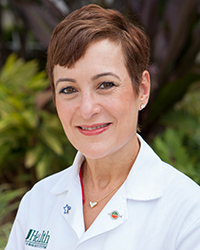 Dr. Abreu’s Research Overview
Dr. Abreu’s Research Overview
The research focus of Dr. Abreu’s laboratory is inflammatory bowel diseases (IBD) and colon cancer. Dr. Abreu has a special interest in the intimate relationship between the intestinal mucosa of the human host and its associated intestinal microbiota. In particular, her laboratory is interested in testing the hypothesis that innate immune receptors that recognize bacteria activate intestinal epithelial cells to proliferate promoting colitis-associated cancer. In addition, through their work in toll-like receptor 4 (TLR4), an innate immune receptor that recognizes bacterial lipopolysaccharide (LPS), the lab members are studying how TLRs can regulate colon stem cells in health and in cancer. Dr. Abreu has also embarked on studies looking at TLR signaling in obesity-dependent intestinal inflammation and cancer. The lab’s recent development of a gnotobiotic (germ-free) animal facility will permit the elucidation of microbial signals leading to inflammation and cancer. Dr. Abreu’s translational research looks at gene-environment interaction resulting in IBD especially in immigrant populations.
The Micky and Madeleine Arison Family Foundation Discovery Laboratory for Crohn’s & Colitis provides a platform to accelerate the advances of promising research from the laboratory to the bedside. By committing resources to research and investing in the future, our physician-scientists strive to develop the next wave of leading-edge therapies in the crusade against IBD.
Current research projects address the following topics:
- How bacteria are recognized by the gut to prevent colon cancer
- The innate immune system in IBD
- The genetics of IBD in minorities
- The genetics of gut bacteria
- Quorum sensing molecules in relation to IBD
In collaboration with the Hussman Institution for Human Genomics at UM, our researchers are analyzing DNA to better understand individuals’ genetic variation in IBD. This comprehension will lead to personalized medicine—individual gene-based information to better manage a patient’s disease. Personalized medicine will transform the traditional “one-size-fits-all” model of medicine used today.
Patients have the opportunity to participate in numerous clinical trials. Those who have failed treatment with conventional medical therapies are encouraged to participate in trials that offer innovative therapeutic options.
For further information please see her UM Physician Profile.
